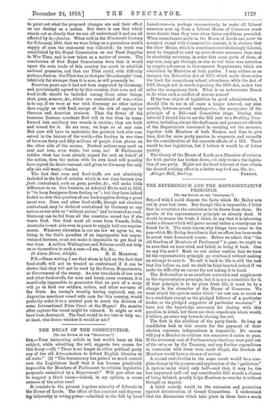THE DECAY OF THE CONSTITUTION.
(To THE EDITOR OP THE SPECTATOR...1 SIB,—Your interesting article in last week's issue on this subject, while admitting the evil, suggests two causes for this decay :—(1) " There is no longer in either political party any of the old determination to defend English liberties at all costs." (2) "The bureaucracy has gained so much control over the Legislature itself that it has become practically impossible for Members of Parliament to criticise legislative proposals submitted by a Department." Will you allow me to suggest a third cause,—indeed, in my opinion, a causa causans of the other two P
It consists in the present hopeless minority of Liberals in the House of Lords. The effect of this constant and depress- ing inferiority in voting-power—admitted to the full by Lord Lansdowne—is, perhaps unconsciously, to make all Liberal measures sent up from a Liberal House of Commons much more drastic than they were when fairer conditions prevailed. When amendments made in the House of Lords can never be accepted except with Conservative consent, it is obvious that the other House, which is sometimes overwhelmingly Liberal, must be tempted to send up more drastic measures than may be absolutely necessary, in order that some parts of them, at any rate, may get through, or else to veil their true intention by cryptic references to Government Departments, which are controlled by Ministers of both parties. I may adduce as an instance the Education Act of 1870, which made three miles the limit for compulsory school attendance, while the Act of 1876, though not in words repealing the 1870 Act, makes two miles the compulsory limit. What is an unfortunate Bench to do when such a conflict of statute arises P If the true object of legislation be good administration, I should like to see in all cases a longer interval, say nine months, between second reading—i.e., the acceptance of the principle of a Bill—and Committee stage. During this interval I should like to see the Bill sent to a Drafting Com- mittee, including always the draftsman and permanent officials of the Departments concerned in carrying out the measure, together with Members of both Houses, and thus to give time, first for mere party passion to evaporate, and secondly for the consideration of the concrete effects of a Bill. There would be less legislation, but I believe it would be of better quality.
The theory of the House of Lords as a Chamber of revision for both parties has broken down,—it only revises the legisla- tion of one party. Might not the fixed interval of time obtain the desired revising effect in a better way P—I am, Sir, &c.,






































 Previous page
Previous page